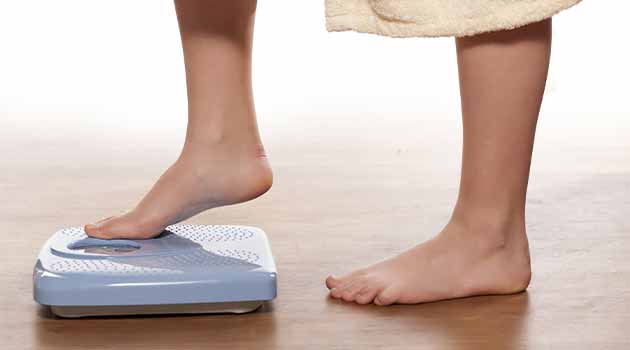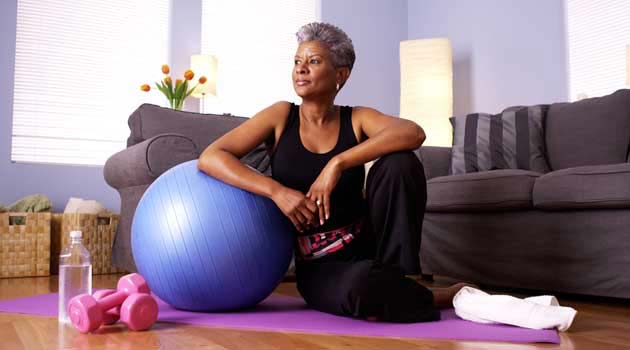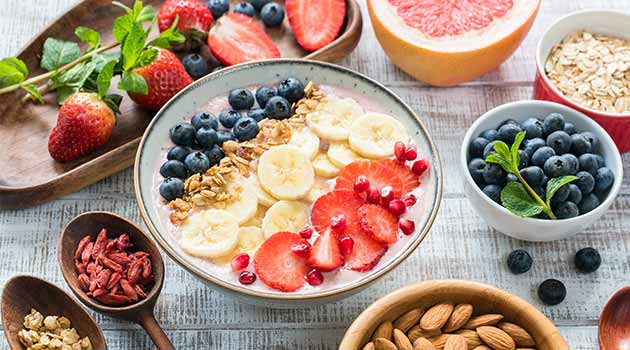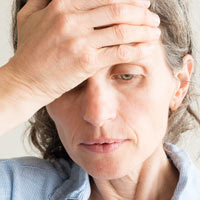
Menopause weight gain - why it happens and what you need to know

Jeans a little tighter lately? While weight gain during menopause is often an unwelcome side effect, there are a few lifestyle changes you can make to reduce the number of pounds that pile on. Here's our guide to menopause weight gain, including why it happens, gransnetters' tried-and-tested tips for keeping the middle-age spread at bay and how to sensibly lose weight during the menopause.
Sign up to Gransnet for more menopause advice
What causes weight gain during menopause?
Menopause is when a woman's periods stop, which means she can no longer conceive naturally. There are many possible side effects of the menopause - one being unwanted weight gain.
"Since the perimenopause and now what seems to be the full-blown menopause, my waist is thickening at an alarming rate!"
A reason for putting on weight is due to the average age a woman experiences menopause - usually between 45 and 55. We've all heard of the middle-age spread, and there is a reason for this: as we grow older, our metabolic rate slows down due to a decrease in muscle. This means it's harder to burn calories, so what you eat may well affect your waistline far more than it did 20 years ago, as these gransnetters have found...
"When I reached 45 my weight slowly started to rise where before it was pretty stable. It fluctuated up and down but, with a lot of willpower, I now manage to keep it down to a normal range for my height but it’s definitely become harder in my middle years."
"I had an early menopause, so it's not related, but my metabolism definitely changed age 50. Before then I could eat anything, but almost overnight the weight started piling on."
A loss of oestrogen during menopause also doesn't help. This change in hormones can increase the risk of speeding up the ageing process where skin loses its support, meaning what was once firm can begin to lose its shape - particularly around the middle.
It's not the case for everyone, however, and some gransnetters have reported experiencing no weight changes at all.
Menopause and weight gain - should I visit my GP?
You may find yourself wondering if the cause of your weight gain is actually because of an underactive thyroid or another medical reason. While it's unlikely to be due to this, if you're worried about unexplained weight gain or menopause bloating, it's worth visiting your GP to discuss your concerns and rule out any medical problems.
Does HRT make you gain weight?
Although many women believe that HRT can make you put on weight, there's actually no evidence to support this. Gaining weight during the menopause is normal but is likely due to other side-effects of the menopause like metabolism getting slower and losing muscle.
How much weight do you gain during menopause?
If you find yourself putting on weight during menopause, you're not alone. The average amount of weight a woman gains is about 10 to 15 pounds (around 4.5 - 7kg), and it's not uncommon to put on more than this. A combination of losing muscle mass, metabolism slowing down and being less likely to exercise regularly, all contribute to changes in weight as we grow older.
How to stop weight gain during menopause
There are a number of different ways that you can combat or avoid menopausal weight gain, whether you're looking to lose weight or have just started to experience menopause symptoms.

1. Exercise regularly
"I do hula hooping and, for the first time since menopause, I've actually got my waist back!"
"I have always been a very active person walking a lot, swimming and doing a lot of gardening. You can get plenty of exercise without having to do anything formal."
Weight gain during menopause can also be attributed to a sedentary lifestyle - we lose muscle mass as we age, which slows down our metabolism. Although exercising regularly can be difficult for those with health issues or physical disabilities, it's important to partake in physical activity in order to stay happy and healthy.
The good news is you don't have to start training for a 5K run in order to up your fitness levels, although if you do want to take up running, the Couch to 5K plan is a fantastic way to take you from couch potato to runner in just nine weeks! Even just walking to the shop or taking the stairs instead of the lift can help.
2. Mix up your workout routine with cardio
It's important to incorporate both cardiovascular exercise and strength training into your lifestyle to fight the middle-age spread.

"If you can't get to a gym or exercise class, there are lots of videos online. Just make sure you warm up first, don't go straight into a new or difficult exercise, and do a stretch afterwards."
Cardio exercise speeds up your heart rate and breathing rate, and has a variety of health benefits, including strengthening the heart, lowering blood pressure and preventing diabetes. Oh, and it's also great for burning calories too which makes it a key element if you're wanting to lose weight during menopause.
The following exercises are all examples of cardio:
- Jogging
- Zumba
- Swimming
- Hiking
- Aerobic activity
3. ...and strength training
While it's great for weight loss, it's not advisable to focus solely on cardio. As we age, we lose muscle so it's essential to also include strength training in your routine to maintain and build muscle.

Strength training includes lifting weights and exercises using your bodyweight, such as squats, sit-ups and lunges. Not only does such training improve balance - which can prevent falls - and tone the body, but it also helps fight sarcopenia (loss of muscle).
Maintaining and building muscle should be a priority when you work out to improve your overall fitness level and strengthen your body. When it comes to abdominal fat, focus on exercises that specifically target your waist and abdominal area, such as sit-ups and crunches, or, for a full-body workout and to improve muscle mass, try these strength training exercises that can easily be done at home.
4. Keep a food and exercise diary
"I use a Fitbit to monitor my activity. I aim for over 10,000 steps a day and often do many more."

If you struggle to remember what you've eaten during the day and want to control what you consume to help reduce excess weight gain, make a note of your meals and snacks. Apps, such as MyFitnessPal, are useful for counting calories, keeping track of your progress and for providing nutrition information to help you make healthier food choices.
5. Change your eating habits for good
"I put on over three stone after menopause and a complete hysterectomy. I went low carb two years ago and I'm now slimmer than I have ever been. You just have to eat real foods, not CRAP (which stands for carbonated, refined, artificial or processed)."
Exercise is highly important, but changing your diet is crucial to shifting those pounds in menopausal women. When it comes to weight gain and menopause, what you eat can make all the difference. In fact, a shift in our food choices can help with a multitude of health issues. It's also worth remembering that certain foods can help to relieve symptoms of menopause. You can find more menopause diet tips here.
If you find that you feel tired, bloated or generally lacking in energy more often than not, it could be time for a change to switch to a healthy diet. While the key is always 'everything in moderation', it's important that you do your research and select your food choices carefully, especially if you have diabetes or suffer from a specific health condition.

There are lots of tips and tricks you can try to adopt healthier habits. Start by weighing your food to better understand portion sizes, or follow the NHS's Eat Well guide, which tells you exactly how much of each food group you should be eating per day.
If you don't know where to get started, there's inspiration aplenty on our recipe section, where you can search our library for delicious healthy meals (and the occasional treat), and share your own. Bon appétit!
6. Share the load
"My sister is dieting with me and that's good motivation to keep going. We check each other's food diaries and share recipes."
Do you lack motivation when it comes to diet and exercise? Do you find it difficult to stick to a regime when you find yourself putting on weight? Don't take on the challenge alone. Find a family member, a friend or even a neighbour to help you along the journey by providing encouragement and support.
There's also a supportive community on our menopause and dieting and exercise forums, so you can talk anonymously to other gransnetters for advice, motivation and tips. Strength in numbers, as they say.
7. Try HRT
"It's HRT and swimming for me!"

While hormone replacement therapy (HRT) won't necessarily prevent weight gain, it will help to ease other menopausal symptoms like hot flashes and night sweats - symptoms that may make day-to-day life, including sticking to a diet and exercise plan, more challenging.
Some health experts also say that HRT may help to increase your metabolism and help you to lose belly fat caused by menopause.
Get the latest health advice delivered straight to your inbox...
Other diet and lifestyle solutions
Here are a few extra health tips, strictly from our users, so you can find out how to lose weight during the menopause in the long term.
1. Attempt the 5:2 Diet
"From the age of 50 my weight just crept up slowly and inexorably. I used my usual weight loss methods without effect. Then five years ago, at the age of 70, the 5:2 diet came on the scene. I went on it and in four months I lost two stone and have not regained it."
"I gained weight during the menopause, mainly around my middle. I was also very stressed which could have been a contributory factor. I only managed to shift the weight by doing the 5:2 diet, which has now become my way of life."

Dr Michael Mosley's 5:2 Diet has certainly garnered praise, particularly for its no-nonsense approach to dieting and its positive effect on blood sugar levels. While some have found the diet tricky to adjust to at first, it has proved extremely useful in helping them to lose weight, so when it comes to menopause and preventing weight gain this is something you might want to consider.
Those on this 'intermittent fasting' diet eat normally for five days a week and then cut their calories to 500 or go with the new method of eating 800 calories on the other two days.
2. Or try the 16:8 method
"My weight crept up through my 50s without me quite noticing. Now at 65, over the last few years I have reduced my weight by a stone with a mix of going to the gym (one hour of fast cardio twice a week), restricting carbohydrates and following a pattern of eating 16:8. I am generally stable now unless there's a very sociable weekend or a holiday."
"I ate less and moved more and slowly but surely the weight started shifting. I never eat between 7pm and about 11am and I really find that helps me. We all have differing metabolisms and I think we have to find what suits our own bodies best."

If you're looking to follow a healthy diet, you might not just want to consider what you're eating, but when you're eating it too. Many gransnetters swear by the 16:8 and, like the 5:2 diet, it does involve intermittent fasting, but in a completely different way. The idea is that you limit your calorie intake to eight hours of the day - for example, you'll only eat between the hours of 10am to 6pm, and you'll 'fast' for the other 16.
3. Grow your own
"I love gardening, which can be very heavy going at times, but a good workout."

Believe it or not, a session of gardening can burn up to 200-400 calories an hour. Not only is this a fun, not to mention productive, way to fit exercise into your daily routine, but you will likely forget you're working out and time will fly. Plus you'll have a wonderful garden as a result - win win!
If your garden's on the small size, fear not, as we have loads of tips for making the most of a minimal space here.
4. Improve your gut bacteria
"I'm taking care of my microbiome with great results. Weight loss without any effort, better sleep and I have lost count of the number of people who have said how well I look."
Reducing the load of unfriendly gut bacteria can be pivotal in helping with weight management. The main way that you can improve your gut bacteria is by eating the right foods and enjoying a diet rich in fibre. These foods may help:
- Ground flaxseed and/or chia seeds, both of which are superfoods
- Pulses, oat bran, nuts and seeds
- Fermented foods like yoghurt and sauerkraut
- High-fibre fruit and vegetables like raspberries, green peas and broccoli
5. Cut back on the booze
"I do think that alcohol is my downfall. I never thought of liquid as being calorific in the past but I suppose a couple of bottles of red a week takes its toll."

It may be tempting to reach for a glass (or two) of wine after a hard day but cutting down your alcohol intake may help you lose weight quicker. Alcohol is highly calorific and low in nutritional value, so it's definitely worth saving it until the weekend or cutting back completely if you're wanting to lose weight.
6. Eat more plant-based
"I'm vegetarian and eat a lot of vegetables and fruit so easily make the recommended 5 portions a day. The food is generally high in fibre and low in saturated fats and salt - all healthy choices."

Including more fruit, veg and pulses into meals can help manage your weight, as these foods tend to be lower in calories and high in fibre. Trying to to eat less red meat will also help manage your weight as it's often high in saturated fat.You don't need to be a vegetarian or vegan to eat less meat; even cutting meat out one day a week can have a big impact on how much veg you eat in its place. These vegetarian recipes are a great start when you're looking for dinner inspiration.
Want to know more about the menopause? We recommend Menopause: The Answers by Dr Rosemary Leonard, a definitive guide of everything you need to know about this stage of life.
Disclaimer: The information on our health pages is only intended as an informal guide and should not be treated as a substitute for medical advice. Gransnet would urge you to consult your GP before you begin any diet if you're concerned about your weight, have existing health conditions and/or are taking medication.
Images: Shutterstock


